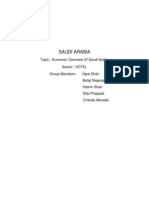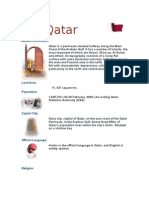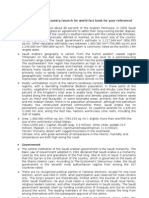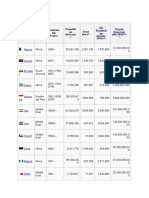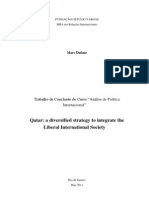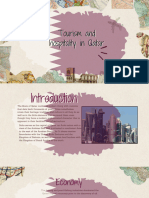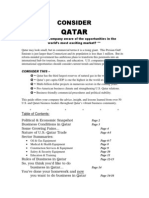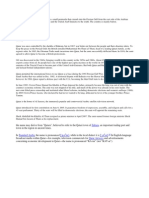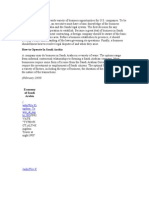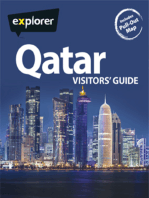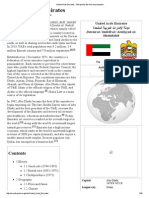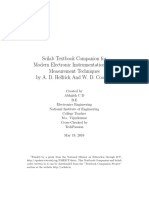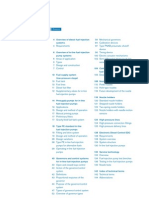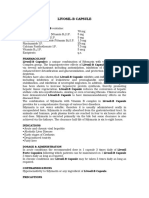Professional Documents
Culture Documents
Qatar
Qatar
Uploaded by
Marika LopezOriginal Description:
Copyright
Available Formats
Share this document
Did you find this document useful?
Is this content inappropriate?
Report this DocumentCopyright:
Available Formats
Qatar
Qatar
Uploaded by
Marika LopezCopyright:
Available Formats
QATAR
Qatar (pronounced KAH-ter) also known as the country or State of Qatar or locally Dawlat Qaar, is a sovereign Arab state, located in the Middle East, occupying the small Qatar Peninsula on the northeasterly coast of the much larger Arabian Peninsula. Its sole land border is with Saudi Arabia to the south, with the rest of its territory surrounded by the Persian Gulf. A strait of the Persian Gulf separates Qatar from the nearby island state of Bahrain. The country is mainly barren. The Qatari peninsula juts 100 miles (161 km) north into the Persian Gulf from Saudi Arabia. It lies between latitudes 24 and 27 N, and longitudes 50 and 52 E. Much of the country consists of a low, barren plain, covered with sand. To the southeast lies the spectacular Khor al Adaid (Inland Sea), an area of rolling sand dunes surrounding an inlet of the Persian Gulf. There are mild winters and very hot, humid summers. The highest point in Qatar is Qurayn Abu al Bawl at 103 metres (338 ft) in the Jebel Dukhan to the west, a range of low limestone outcroppings running north-south from Zikrit through Umm Bab to the southern border. The Jebel Dukhan area also contains Qatars main onshore oil deposits, while the natural gas fields lie offshore, to the northwest of the peninsula. Qatar has been ruled as an absolute monarchy by the Al Thani family since the mid19th century. Formerly a British protectorate noted mainly for pearling, it became independent in 1971, and has become one of the region's wealthiest states due to its enormous oil and natural gas revenues. In 1995, Sheikh Hamad bin Khalifa Al Thani became Emir when he seized power from his father, Khalifa bin Hamad Al Thani, in a peaceful coup d'tat.[7] The most important positions in Qatar are held by the members of the Al Thani family, or close confidants of the al- Thani family. Beginning in 1992, Qatar has built intimate military ties with the United States, and is now the location of U.S. Central Commands Forward Headquarters and the Combined Air Operations Center. Emir: Sheik Hamad bin Khalifa al-Thani (1995) Prime Minister: Sheik Hamad bin Jassem al Thani (2007) Total area: 4,416 sq mi (11,437 sq km) Population (2010 est.): 840,926 (growth rate: 0.9%); birth rate: 15.5/1000; infant mortality rate: 12.2/1000; life expectancy: 75.5; density per sq mi: 214 Capital (2003 est.): Doha, 550,700 (metro. area), 318,500 (city proper) Monetary unit: Qatari riyal Islam is the predominant religion. In March 2008, a Roman Catholic Church, Our Lady of the Rosary, was consecrated in Doha. No missionaries were allowed in the community. The church will have no bells, crosses or other Christian symbols on it and its premises. The economic growth of Qatar has been almost exclusively based on its petrol and natural gas industry, which began in 1940. The country has experienced rapid growth over the last several years due to high oil prices, and in 2008 posted its eighth consecutive budget surplus. Economic policy is focused on developing Qatar's non-associated natural gas reserves and increasing private and foreign investment in non-energy sectors, but oil and gas still account for more than 50% of GDP; roughly 85% of export earnings, and 70% of government revenues. Oil and gas have made Qatar one of the highest per-capita income countries, and one of the world's fastest growing. The World Fact book states that Qatar has the second-highest GDP per capita in the world, after Liechtenstein. Proved oil reserves of 15 billion barrels should enable continued output at current levels for 37 years. Qatar's proved reserves of natural gas are nearly 26 trillion cubic metres, about 14% of the world total and the third largest in the world. Before the discovery of oil, the economy of the Qatari region focused on fishing and pearl hunting.
You might also like
- Qatar Airways Pre Induction Booklet July 2012Document48 pagesQatar Airways Pre Induction Booklet July 2012Macoy Jimenez100% (4)
- Hotel Sector of Saudi ArabiaDocument17 pagesHotel Sector of Saudi Arabiamaliwal123No ratings yet
- The Umbrella Man by Roald DahlDocument4 pagesThe Umbrella Man by Roald DahlCristina Filip100% (3)
- Qatar: Geographical LocationDocument5 pagesQatar: Geographical LocationChen LiNo ratings yet
- How To Settle in QatarDocument23 pagesHow To Settle in QatarAbs ShahidNo ratings yet
- Qatar Economy and Problems Against ItDocument9 pagesQatar Economy and Problems Against ItNasih AhmadNo ratings yet
- UntitledDocument7 pagesUntitledmrycojesNo ratings yet
- Qatar: by Miguel RosadoDocument8 pagesQatar: by Miguel RosadoGary WalshNo ratings yet
- QatarDocument18 pagesQatarKhalil100% (1)
- Saudi Arabia I. Basic Facts About The Country (Search For World Fact Book For Your Reference) GeographyDocument9 pagesSaudi Arabia I. Basic Facts About The Country (Search For World Fact Book For Your Reference) GeographyÀlbert Francisco RiveraNo ratings yet
- Assignment 4Document1 pageAssignment 4Ahmed OusamaNo ratings yet
- QatarDocument2 pagesQatarAtik MahmudNo ratings yet
- Assignment On QatarDocument18 pagesAssignment On QatarAhmed Imtiaz AlmanNo ratings yet
- QatarDocument36 pagesQatarAsad Bin Ala QatariNo ratings yet
- OBJ3ENGLISHDocument5 pagesOBJ3ENGLISHLaurimar Silva HernándezNo ratings yet
- Transforming The Desert Landscape - Qatar's Journey From Pearls To Petroleum Wealth and Rapid ModernizationDocument37 pagesTransforming The Desert Landscape - Qatar's Journey From Pearls To Petroleum Wealth and Rapid ModernizationKris GopalNo ratings yet
- QatarDocument7 pagesQatarOmer JavedNo ratings yet
- Qatar Booklet EN-14Aug-digitalDocument99 pagesQatar Booklet EN-14Aug-digitalilmaNo ratings yet
- Iraq Facts and FiguresDocument13 pagesIraq Facts and FiguresAjay TahilramaniNo ratings yet
- Flag of KuwaitDocument10 pagesFlag of Kuwaitrichmond maganteNo ratings yet
- GCRDocument75 pagesGCRArti DobariyaNo ratings yet
- API - QatarDocument16 pagesAPI - Qatarmarc.dufour4897No ratings yet
- Obp 0238 08Document20 pagesObp 0238 08alvinadeptNo ratings yet
- Investigación - English - Qatar - 2022Document9 pagesInvestigación - English - Qatar - 2022Jeremias LusichNo ratings yet
- Qatar HistoryDocument10 pagesQatar HistoryGlo VillaNo ratings yet
- Lawrence Beray Term Paper POSC23Document25 pagesLawrence Beray Term Paper POSC23Lawrence Gerald Lozada BerayNo ratings yet
- QatarDocument6 pagesQatarChristelle LopezNo ratings yet
- What Do You Know About Chad?: at The Economic LevelDocument5 pagesWhat Do You Know About Chad?: at The Economic LevelNguetti JoëlNo ratings yet
- QatarDocument2 pagesQatardftongcoNo ratings yet
- Qatar Then and NowDocument3 pagesQatar Then and NowMaram GhaziNo ratings yet
- QATAR7Document2 pagesQATAR7Cássio MagalhãesNo ratings yet
- Explore QatarDocument15 pagesExplore QatarDies Natalis UnsapNo ratings yet
- العراقDocument2 pagesالعراقAimen NekkacheNo ratings yet
- الاخيرDocument17 pagesالاخيرDana AlsarawaniNo ratings yet
- Consider Qatar GuideDocument16 pagesConsider Qatar GuideibnrafeeqNo ratings yet
- Genesis Downloadable Guide QatarDocument13 pagesGenesis Downloadable Guide QatarRoel SoelemanNo ratings yet
- QatarDocument1 pageQatarAvilah HoraNo ratings yet
- Qatar 1Document1 pageQatar 1Rohan SharmaNo ratings yet
- Bahrain TIP and Water ReportDocument48 pagesBahrain TIP and Water Reportfati159No ratings yet
- Qatar IntroDocument2 pagesQatar Introsajjad sheraziNo ratings yet
- Qatar: Energy For Development: Submitted By: Avani Patel Enrollment Number: 20205029Document5 pagesQatar: Energy For Development: Submitted By: Avani Patel Enrollment Number: 20205029Avani PatelNo ratings yet
- Kuwait:) Gulf Arabic PronunciationDocument3 pagesKuwait:) Gulf Arabic PronunciationJohn PaycanaNo ratings yet
- Chad Cameroon PipelineDocument12 pagesChad Cameroon PipelineskhhmlNo ratings yet
- Qatar HistoryDocument1 pageQatar HistoryscrpNo ratings yet
- Country Analysis: Click To Edit Master Subtitle StyleDocument25 pagesCountry Analysis: Click To Edit Master Subtitle StyleJohar MenezesNo ratings yet
- Kingdom Tower at Night - JPG: How To Operate in Saudi ArabiaDocument6 pagesKingdom Tower at Night - JPG: How To Operate in Saudi ArabiaUzma YousufNo ratings yet
- KuwaitDocument14 pagesKuwaitxxlbearNo ratings yet
- QatarDocument54 pagesQataringmkhNo ratings yet
- Qatar - PPTX (Autosaved)Document33 pagesQatar - PPTX (Autosaved)Zahra Shafira AlwainyNo ratings yet
- Economy of CuraçaoDocument5 pagesEconomy of CuraçaoAman DecoraterNo ratings yet
- KuwaitDocument15 pagesKuwaitRohit SharmaNo ratings yet
- KuwaitDocument1 pageKuwaitPopa Anne MarieNo ratings yet
- The Qatar Crisis: Middle East Freezes Out Qatar: What You Need To KnowDocument7 pagesThe Qatar Crisis: Middle East Freezes Out Qatar: What You Need To KnowMukund KakkarNo ratings yet
- Monetizing Natural Gas: Qatar's Chemical IndustryDocument4 pagesMonetizing Natural Gas: Qatar's Chemical IndustryMMHF100% (1)
- The Qatar Crisis Is TransientDocument6 pagesThe Qatar Crisis Is TransientStefos PepesNo ratings yet
- Qatar Country ProfileDocument23 pagesQatar Country ProfileSandersLNo ratings yet
- United Arab Emirates - Wikipedia, The Free EncyclopediaDocument33 pagesUnited Arab Emirates - Wikipedia, The Free EncyclopediaRickson Viahul Rayan CNo ratings yet
- Application Knowledge Spine Coat & Side Bead System Drawing Roba PUR 2 MOD, Spine Coat 65, Concept B, Side Bead - enDocument1 pageApplication Knowledge Spine Coat & Side Bead System Drawing Roba PUR 2 MOD, Spine Coat 65, Concept B, Side Bead - enA JunedNo ratings yet
- Legal DrugsDocument2 pagesLegal DrugsAXEL V. ICARUSNo ratings yet
- Sensual Meditation LoveDocument143 pagesSensual Meditation LoveMamas Matriarch100% (1)
- En SSP 340 The Passat 2006 Electrical System 1Document19 pagesEn SSP 340 The Passat 2006 Electrical System 1molnar nicuNo ratings yet
- Brew HavenDocument4 pagesBrew HavenGerria MibulosNo ratings yet
- Shakeology Novel 1Document72 pagesShakeology Novel 1Lisa Powers100% (1)
- The Great Cloud of BlessingsDocument5 pagesThe Great Cloud of BlessingsSiegfried Schwaiger100% (1)
- MODULE 2C Four Themativ Areas - Overview Disaster Response12Document44 pagesMODULE 2C Four Themativ Areas - Overview Disaster Response12Don Mariano Marcos Elementary SchoolNo ratings yet
- Pyrolysis PlantDocument8 pagesPyrolysis PlantSherry HenryNo ratings yet
- Environmental Biodegradation of Synthetic Polymers II. Biodegradation of Different Polymer GroupsDocument17 pagesEnvironmental Biodegradation of Synthetic Polymers II. Biodegradation of Different Polymer GroupssonchemenNo ratings yet
- Sri Meiyazhagan BDocument3 pagesSri Meiyazhagan Bsarath chand chowdaryNo ratings yet
- Code SheetDocument7 pagesCode SheetKarl Ervin Landicho100% (1)
- Samuel Christian College: "Aerobic, Muscle and Bone Strengthening Activities"Document18 pagesSamuel Christian College: "Aerobic, Muscle and Bone Strengthening Activities"Julie ArcillaNo ratings yet
- Modern Electronic Instrumentation and Measurement Techniques A D Helfrick and W D Cooper PDFDocument76 pagesModern Electronic Instrumentation and Measurement Techniques A D Helfrick and W D Cooper PDFXahid Yousaf100% (1)
- Medicine American Journal of Hospice and PalliativeDocument7 pagesMedicine American Journal of Hospice and PalliativeFlory23ibc23No ratings yet
- Bioqt 01Document84 pagesBioqt 01Osama AlrawabNo ratings yet
- Chemical Peel Consent 1Document3 pagesChemical Peel Consent 1Argha SaputraNo ratings yet
- Buon Ma Thuot CoffeeDocument46 pagesBuon Ma Thuot CoffeeDoan Pham ManhNo ratings yet
- SYMAP User Manual v4.24 enDocument147 pagesSYMAP User Manual v4.24 enVinil KumarNo ratings yet
- Compal Confidential: Diner Braswell M/B LA-D704P Schematics DocumentDocument52 pagesCompal Confidential: Diner Braswell M/B LA-D704P Schematics DocumentacftnicNo ratings yet
- Cara Kerja PlungerDocument4 pagesCara Kerja PlungerGaLih Pancaran SentirNo ratings yet
- Company-Profile 2Document27 pagesCompany-Profile 2Solar OngridNo ratings yet
- An Introduction To Electronics, KnjigaDocument305 pagesAn Introduction To Electronics, Knjigazelko kovacevicNo ratings yet
- Main Steam PressureDocument1 pageMain Steam PressureuthaNo ratings yet
- Livosil B CapsDocument2 pagesLivosil B CapsAnonymous loKgurNo ratings yet
- Vibrational HealingDocument4 pagesVibrational HealingVichayoot MeethavornNo ratings yet
- Active Learning For Hyperspectral Image Classification A Comparative ReviewDocument23 pagesActive Learning For Hyperspectral Image Classification A Comparative ReviewAdduru U G SankararaoNo ratings yet
- Examples of Argumentative EssayDocument5 pagesExamples of Argumentative EssayNawa best100% (1)
- Freak KitchenDocument9 pagesFreak KitchenHilton AraújoNo ratings yet

